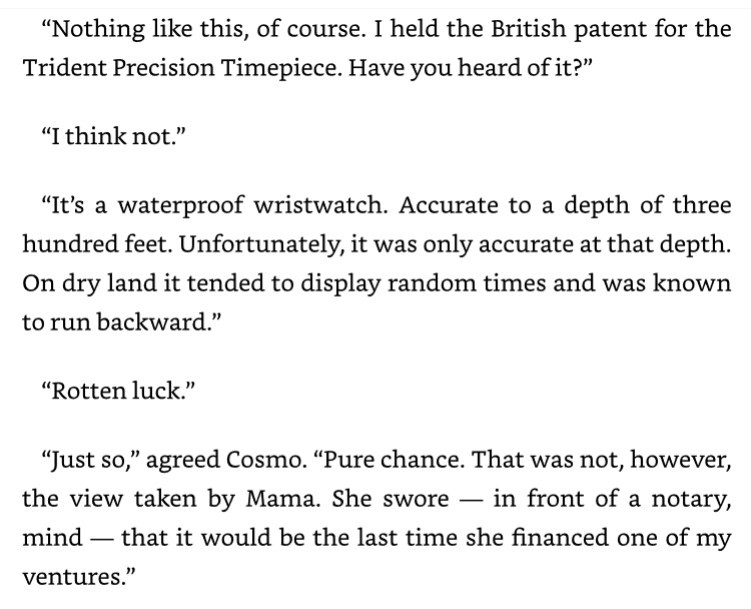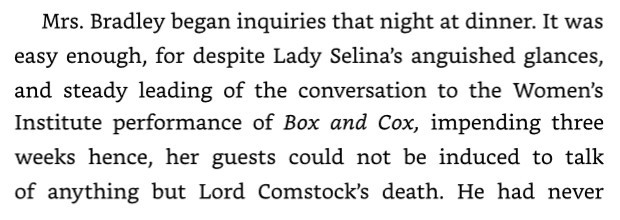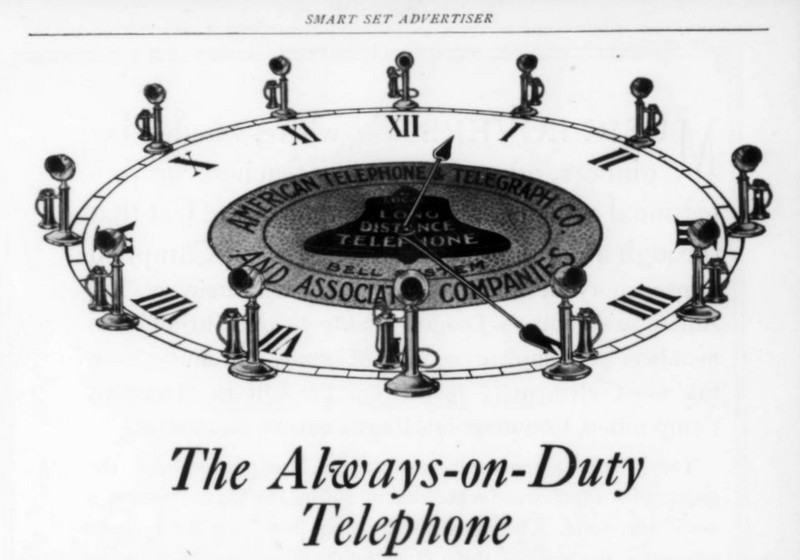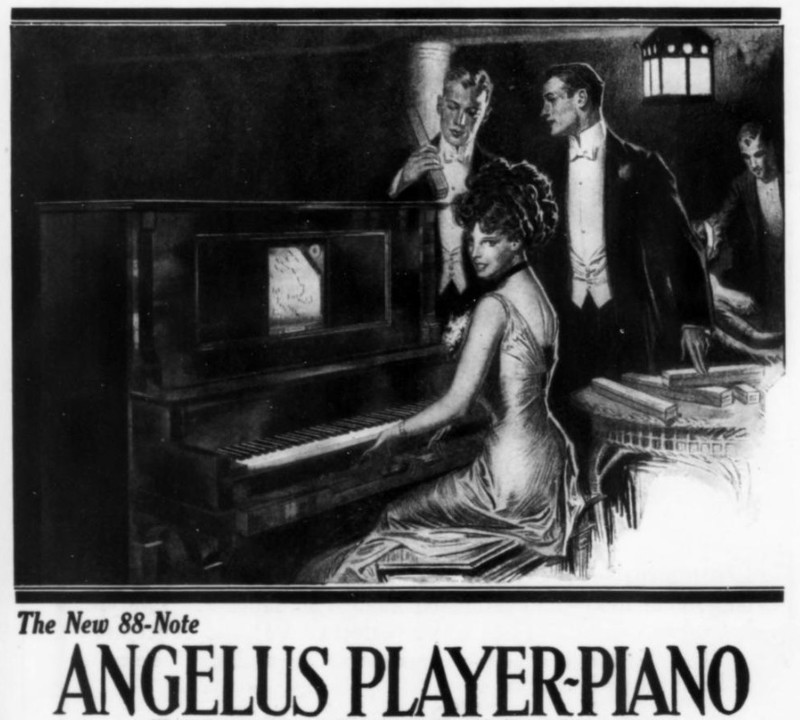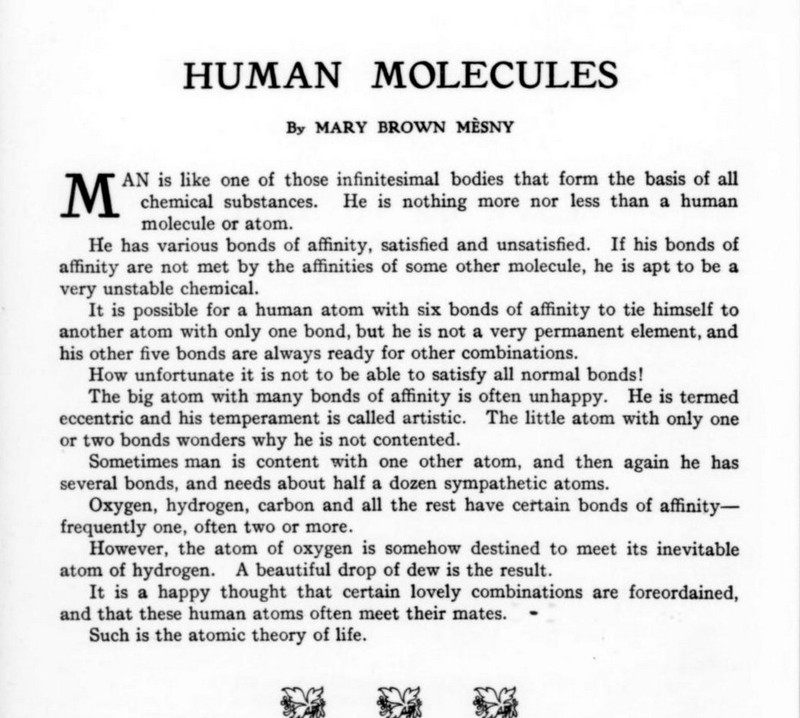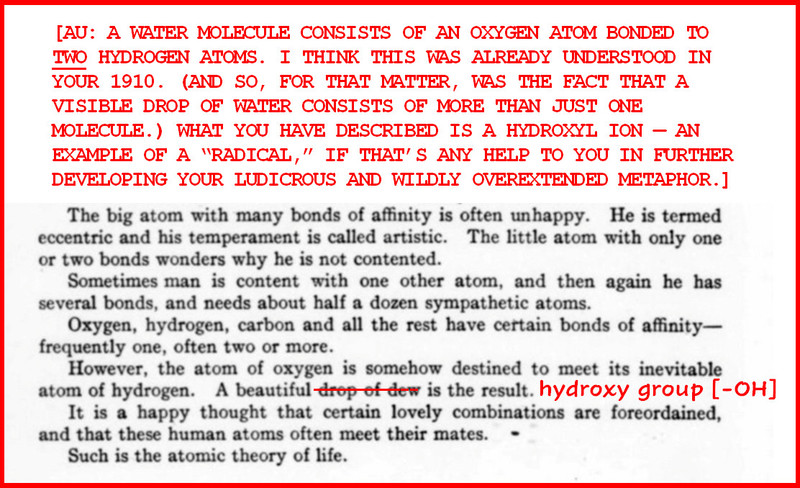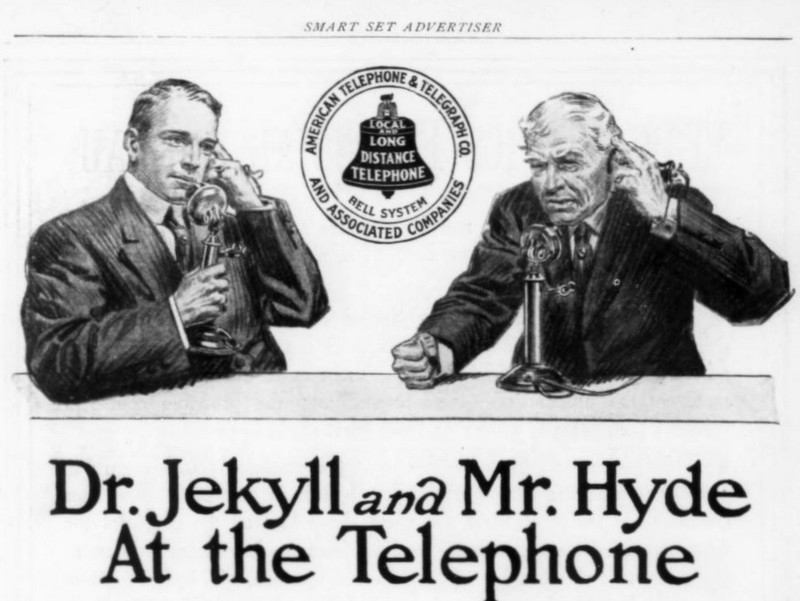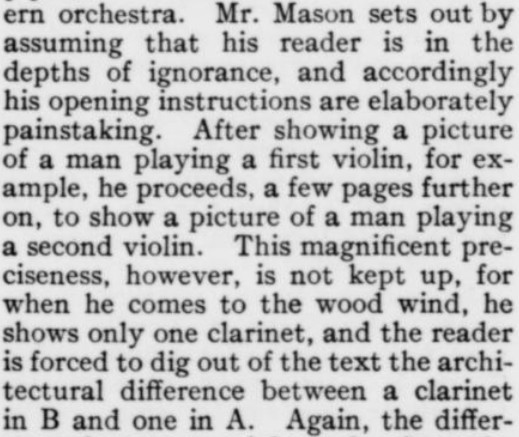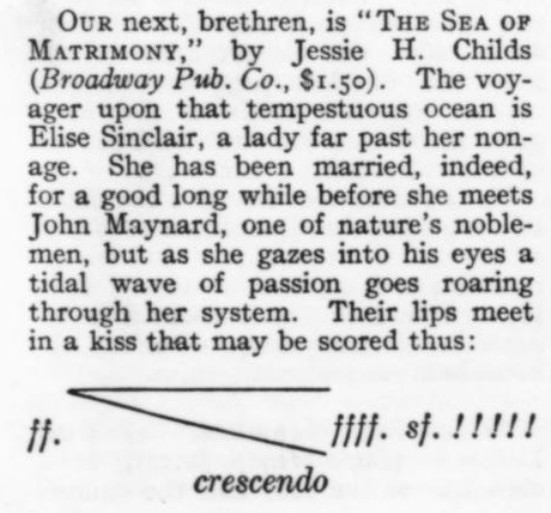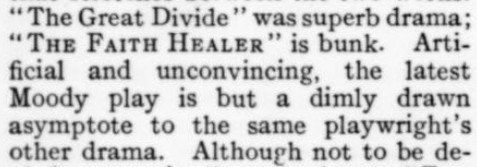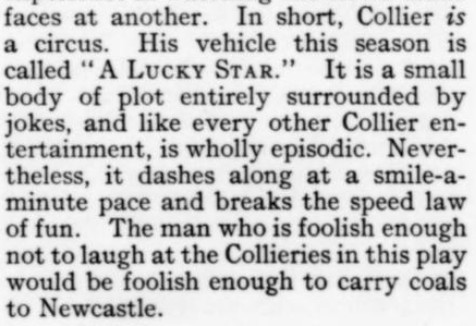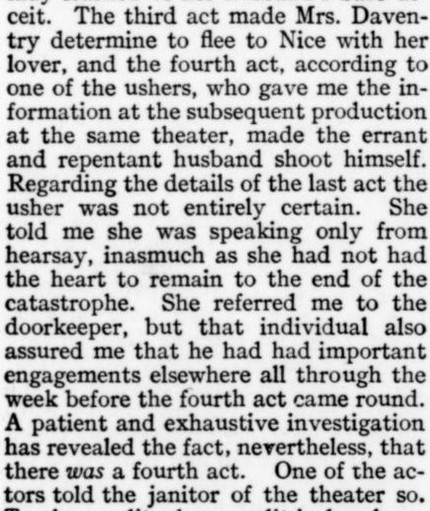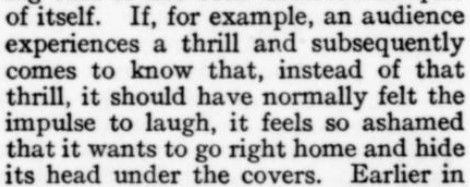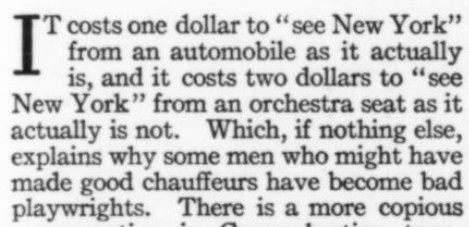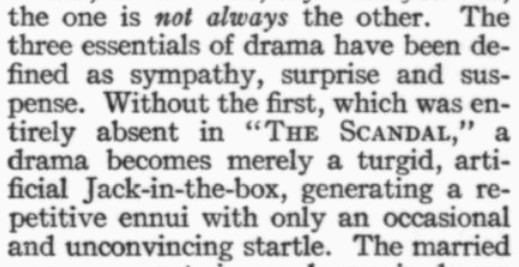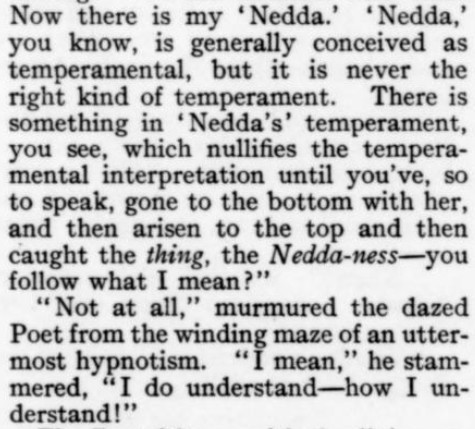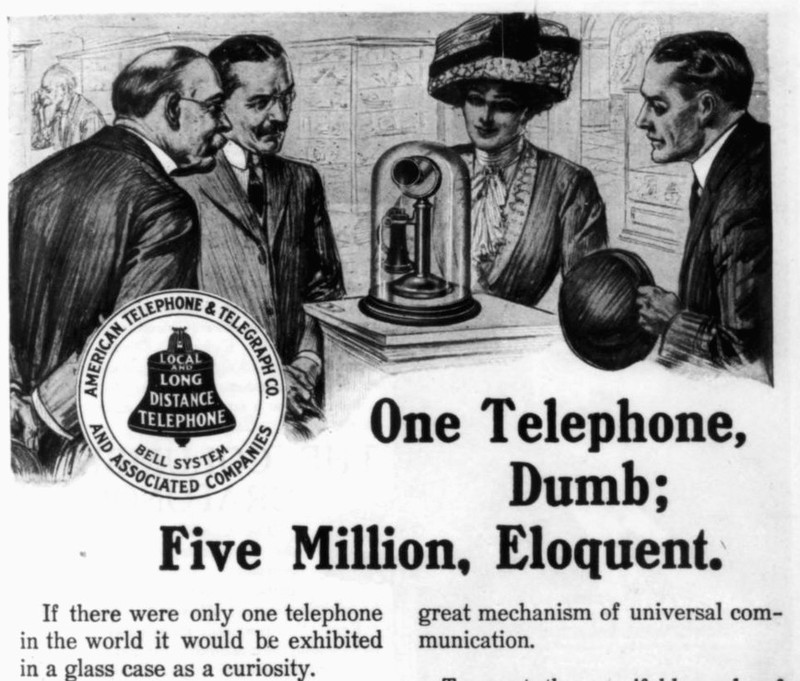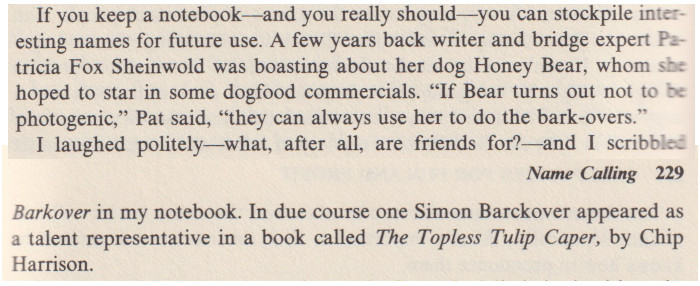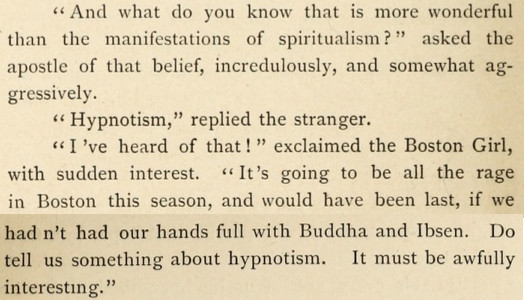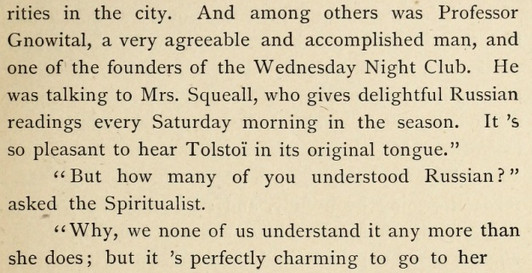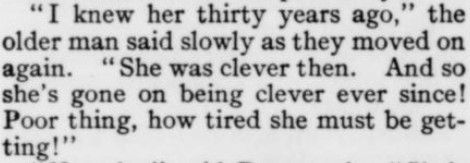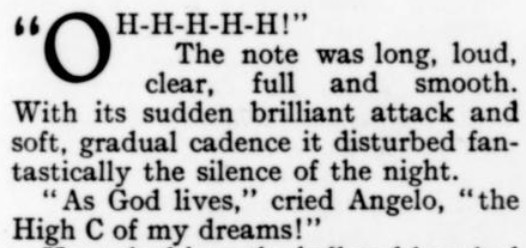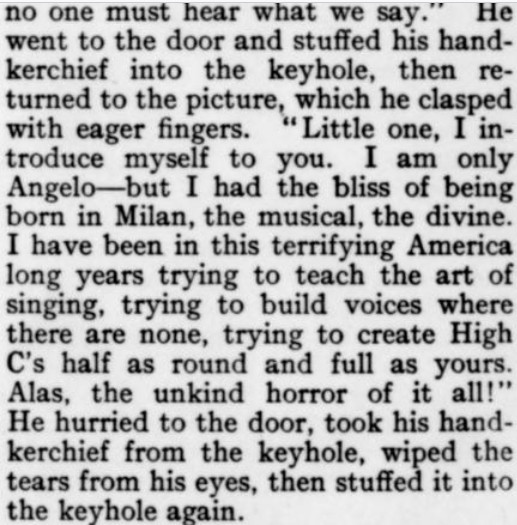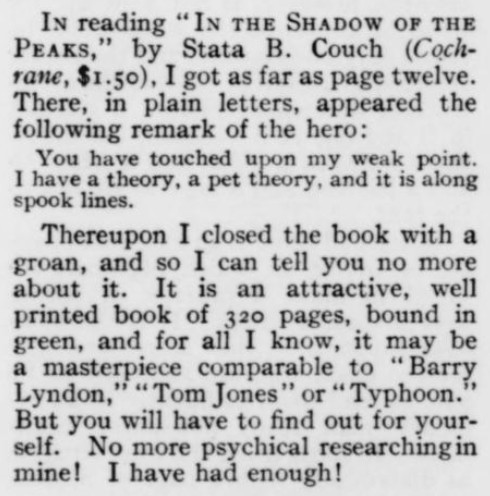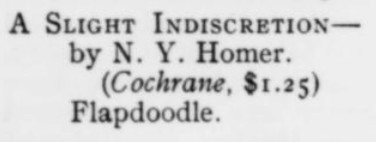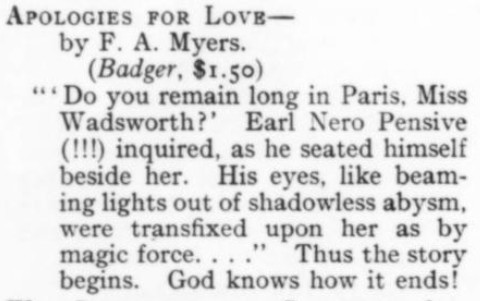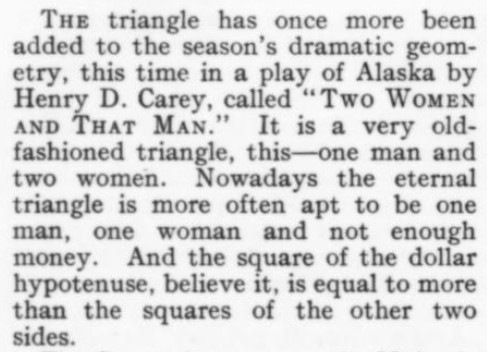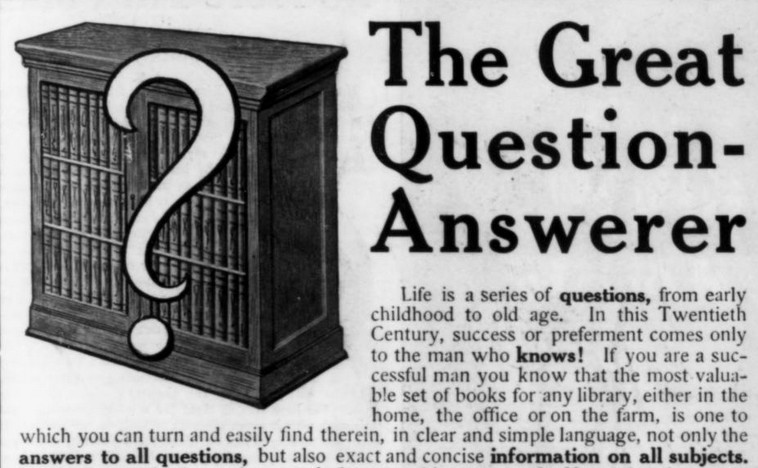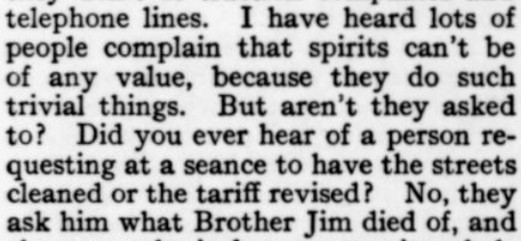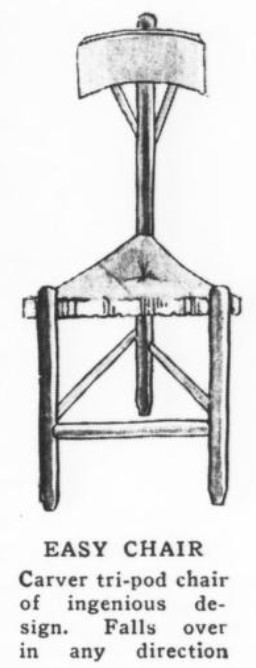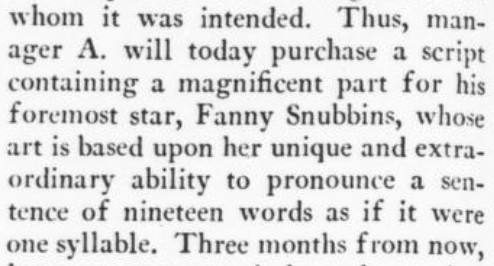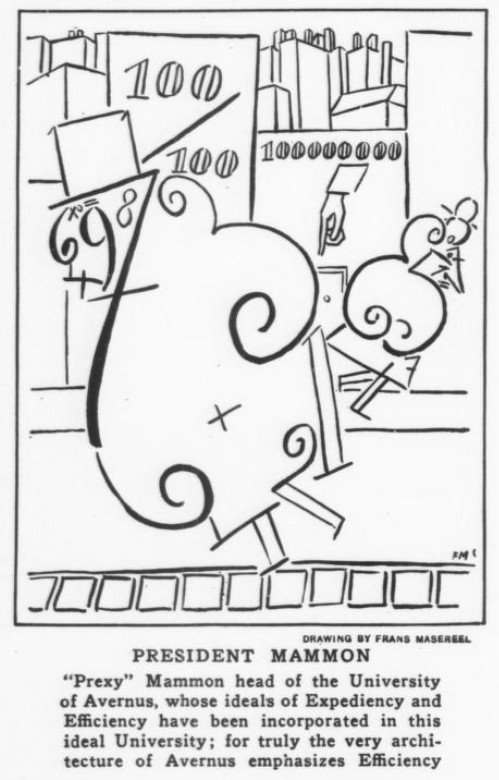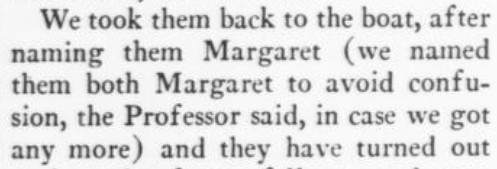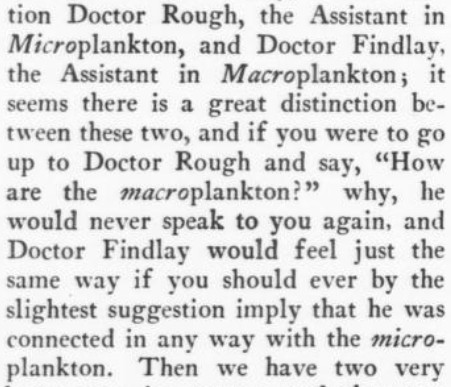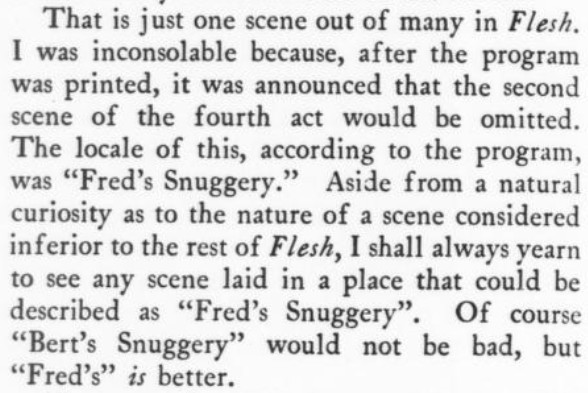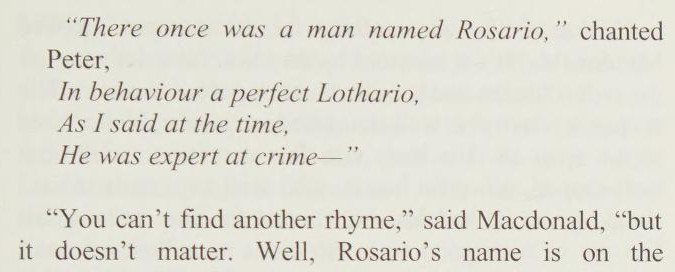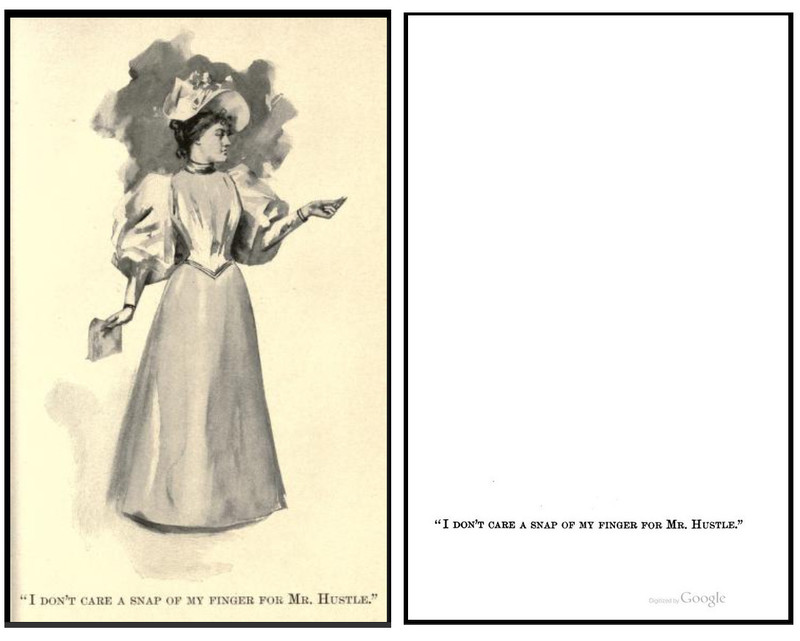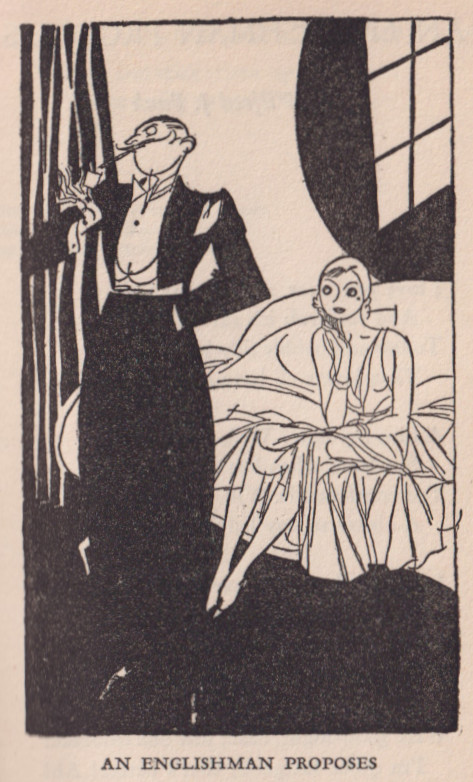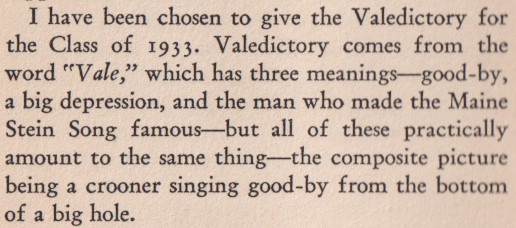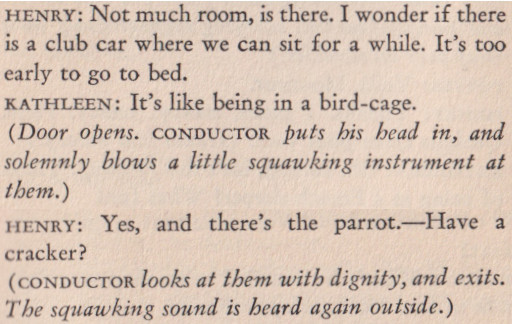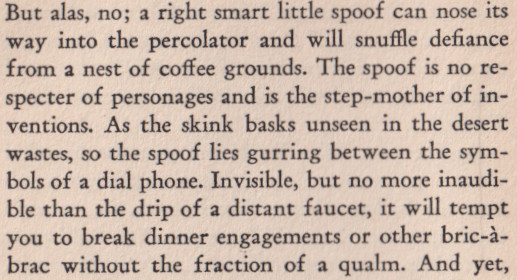|
|
 |
 |
 |
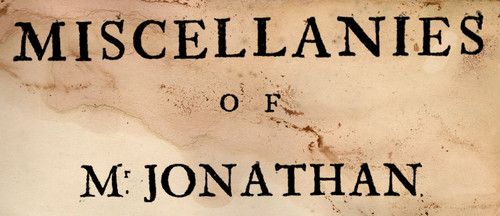
unearths some literary gems.
***
"Some posh bloke with one of those names that don't know where to stop; Monty McMontague-Mount-Muckity, or some such."
***
He cultivated a grey moustache that passed beneath his nose as part of a full orbit around his head, taking in mutton-chop sideburns and the coastal region of a glistening bald pate.
***
"Don't be an ass, Boisjoly," said Ivor in that flat, uninflected sort of way in which one says "Don't be a teapot" to a teapot.
***
Barking [that's a character's surname] had allowed his mind to wander, and when it returned it appeared to have stumbled on something and knocked it over.
***
Ivor squinted in thought, as though focusing on the question, which occupied an uncertain spot somewhere in the air between us.
***
[Bonus: "the leopard's loungewear" (i.e., cat's pajamas).]
[Bonus: Re. someone impersonating a character called Flaps Fleming, we have a reference to "two Flaps Fleming"--thus a rare instance where the pluralization of the first name rather than the second is merely *implied*, since the name already ends in S. (But when the allusion recurs, the author goes with the more pedestrian "Flaps Flemings.")]
|



 |
|
|
 |
 |
 |

unearths some literary gems.
From Ask a Policeman, by The Detection Club:
***[She] gave a loud cackle of laughter that set off Lady Selina's parrot.[Later, the same (human) character's laughter is described as "a macaw-like screech."]***"A waggonload of monkeys is nothing, you might say, to Fate."[I didn't find evidence of this aphorism, per se, elsewhere, though wagon- or cartloads of monkeys crop up in a general way. In the present instance, where there's an implication of Fate acting in unexpected ways, I guess the proverbial monkeys have proverbial typewriters, or the equivalent.]***[The sheet of notepaper] had been so hastily torn from a writing-pad that at least one-seventh of its total surface had never got as far as the envelope, but remained adhering to the parent block.***Anderson was tall and dark, lean-faced, with one eyebrow more uptilted than the other and consequently a permanent air of polite skepticism.***Anderson laughed, all "man-of-the-world-with-more-experience-than-you-my-young-friend."***[N.B. Tweedle's full name is Mr. ffulke Tweedle.]
|

 |
|
|
 |
 |
 |

unearths some literary gems.
From The Smart Set, 1910:
***Mr. Ade must have Slipped on the Banana Peel of humor when he Committed the Book of this play. [George Jean Nathan; I'm not sure of the reason for the initial caps]***Like a cracked bell, the fundamental idea and purpose [of the play] is there, but it does not ring true. [Nathan]***The rest of the cast was equally pathetic. Arthur Maude, as Mr. Daventry, committed suicide three acts too late. [Nathan]***Children of Destiny...was presented at the Savoy Theater for two weeks during Lent, and is now playing a long engagement in the storehouse. [Nathan]***Without Miss Holbrook, Bright Eyes would need glasses. [Nathan]***The humor of the first act is obtained through confusing an umbrella with a young woman named Mabel. [Nathan]***Miss Oza Waldrop acted the ingénue part in her usual saccharine, sputtering manner of a firecracker exploding in a can of maple syrup. [Nathan]***It contains a decidedly funny burlesque of the "you can't even hold that gun episode"...the revolver in this case, however, being a ham sandwich. [Nathan]***a pianist whose "artistic temperament" registers about one hundred and four degrees in the shade [Nathan]***[Bonus: a real book entitled Neither Do I]Notes on some of the attachments:1. That Angelus player-piano ad looks to me like it would be the cover of a pulp paperback novel about vampires in a bordello.
2. "[How to Be?] His Own Cyrano"
3. Nathan's "eternal frankfurter": a precursor (by only a few years, I see) to the Famous Coney Island Hots?
|




 |
|
|
 |
 |
 |

unearths some literary gems.
From The Literary Shop and Other Tales, by James L. Ford:
***One Friday morning, many years ago, I went with this poet to the Ledger building, and there found half a dozen writers gathered together in an outer office, anxiously watching the dark shadow of a man that was thrown upon a partition of ground glass that extended from floor to ceiling across the room and separated it from the private office of the great editor.The dark moving shadow on which every eye was fixed was that of Robert Bonner himself, and as it was seen to cross the room to a remote corner—growing smaller and fainter as it receded—every face brightened with hope, and forms that had seemed bent and dejected but a moment before were suddenly straightened. An instant later the door opened and the editor of the Ledger crossed the threshold, handed a ten-dollar bill to one of the waiting poets, and then hastily retired to his own den again.Then my friend showed me how the watchers could tell by the movements of the dark shade whether a poem had been accepted or refused. If the editor walked from his desk to the remote corner of his private office they knew that he did it in order to place a poem in the drawer of an old bureau in which he kept the accepted manuscript; but if, on the other hand, he came directly to the door a horrible feeling of anxiety came into every mind, and each poet uttered a silent prayer—while his heart literally stood still within him—that the blow might fall on some head other than his own.***[Ford is unable to stick to just one animal when critiquing Mr. Rhodes!]He prints the program of the soirée given by Rodolphe and Marcel, and then observes, with the solemnity of a Central Park pelican: “There is nothing very humorous in this, as will be observed, and yet it may be regarded as one of the best specimens of Murger’s genre.”[...]But let us turn from the awful spectacle of Mr. Rhodes standing like a lone penguin in the very midst of the Latin Quarter of Paris....[...]But to return to our sheep—and in the case of Mr. Rhodes the word is an apt one....***“What! you here to-night?” exclaimed old man Sweeny as a frail figure muffled up in a huge ulster staggered through the doorway and stood leaning against the wall, trying to catch his breath.“Yes; I felt that I couldn’t stay away from the footlights to-night. They tell me I’m old and worn out and had better take a rest, but I’ll go on till I drop;” and with a hollow cough the Old Gag plodded slowly down the dim and drafty corridor, and sank wearily on a sofa in the big dressing-room, where the other Gags and Conundrums were awaiting their cues.“Poor old fellow!” said one of them, sadly, “he can’t hold out much longer.”“He ought not to go on except at matinées,” replied another veteran, who was standing in front of the mirror trimming his long, silvery beard; and just then an attendant came in with several basins of gruel, and the old Jests tucked napkins under their chins and sat down to partake of a little nourishment before going on.The bell tinkled and the entertainment began. One after another the Jokes and Conundrums heard their cues, went on, and returned to the dressing-room; for they all had to go on again in the after-piece. The house was crowded to the dome, and there was scarcely a dry eye in the vast audience as one after another of the old Quips and Jests that had been treasured household words in many a family came on and then disappeared to make room for others of their kind.As the evening wore on the whisper ran through the theatre that the Old Gag was going on that night—perhaps for the last time; and many an eye grew dim, many a pulse beat quicker at the thought of listening once more to that hoary Jest, about whose head were clustered so many sacred memories.[...]“You’re hardly strong enough to go on to-night,” said a Merry Jest, touching him kindly on the arm; but the gray-bearded one shook him off, saying hoarsely:“Let be! let be! I must read those old lines once more—it may be for the last time.***[From a section on "The Jokal Calendar"]So even must the humorist recognize the different periods allotted respectively to goats, stovepipes, ice-cream, and other foundations of merriment.[...]If it be a late fall the public may slide along on banana and orange peel jokes until the first cold snap warns housekeepers of the necessity of putting up stovepipes. [The inclusion of orange peels alongside banana peels is interesting.][...]What the reindeer is to the Laplander the goat is to the writer of modern humor. His whole life is devoted to the service of the paragraphist.***Seizing an ancient jest, he tears it from the soil, carefully cleanses the esculent root from its clinging mould, and then proceeds to revamp it for modern use.[...]It has awakened laughter among...Athenians as they lay stretched in languid and perfumed ease immediately after the luxurious bath, and about two hundred years before Christ. It has been said that cleanliness is next to godliness, and yet we find that in this instance there was room to slip this joke in between the two, and have two hundred years of space left.***Mr. McClure showed me a building which he erected last spring and which is now used as a canning factory and warehouse for the storage of perishable goods.“You see,” said Mr. McClure, “we are doing a very large business here, and supplying not only my own magazine and newspaper syndicate with matter, but also various other publications, which I cannot name for obvious reasons, so it frequently happens that we find ourselves at the close of some holiday season with a number of poems, stories, or essays relating to that particular holiday left on our hands. These ‘perishable goods,’ as we call them in the trade, were formerly a total loss, but now we can and preserve them until the holiday comes round again.”[...]We were still standing there, when one of the hands, who seemed to be working overtime, appeared with a step-ladder, climbed up to one of the highest shelves, and brought down three dusty Washington’s Birthday jars, which he opened on the spot. Two were in good condition, but the third containing a poem on “Our Uncrowned King,” was found to be in a bad state of preservation and emitted such a frightful odor that the workman hastily carried it outside the building, Mr. McClure and I following to see what was the matter with it. The poem was lifted out with a pair of pincers, and we saw in an instant that decay had started in the third verse, in which “Mount Vernon” was made to rhyme with “burning,” and had spread until the whole thing was ruined.“I am very lucky to get off as easily as this,” said Mr. McClure, as he noted the name of the author of the defective rhyme, “because it sometimes happens that these jars containing rotten poetry explode and do a great deal of damage.***“You were tralalooing with the De Sneides of Steenth Street, and you dare not deny it!”***
|

 |
|
|
 |
 |
 |

unearths some literary gems.
|






 |
|
|
 |
 |
 |

unearths some literary gems.
|


 |
|
|
 |
 |
 |

unearths some literary gems.
From Cherub Devine, by Sewell Ford:
***Bulkins snorted a fresh appreciation of his own humour, winking roguishly at an astonished broker's clerk who happened to be passing.***The place was all so empty and still! He looked up and down. the long bare veranda, then out across the vividly green lawn. No one was in sight. Behind him were those many darkened rooms from which issued no sounds. The shades of all the front windows were drawn, and the yellow and white awnings masked them still more. It was as if the place had been put to sleep by a mesmerist. He wished he knew how to wake it up.***"It's like playing hide and seek and being it all the time," was his comment.***The Hewingtons, it seemed, were addicted to postscripts.***In fact, the Walloway butler, who weighed twice as much as Eppings and was haughtier in proportion, was coldly doubtful as to whether or not Mr. Nicholas Walloway could be seen.***"I feel like--well, like 5/8 off and nothing bid."***When perplexed and agitated, he polished his glasses; quite a dignified and refined manner of giving relief to his feelings. When merely lost in calm thought, he twirled them about his forefinger by the little gold chain to which they were attached.***Now, one doesn't expect to find a man in frock coat and silk hat dodging behind bushes on a place like Hewington Acres. Yet "Cherub" Devine had come to associate that particular part of Long Island with all sorts of surprises. He was inclined to accept this new manifestation as part of the general programme.***the tails of his frock coat fluttering a taunting salute as he spurted towards freedom***[Bonus: the Miller-Tremways, later referred to as "those hyphen Tremways"][Bonus: Baden-Baden referred to as "Baden Two Times"]
|

 |
|
|
 |
 |
 |

unearths some literary gems.
From Spoofs, ed. Richard Butler Glaenzer:
***Merely coax the spoof to trade places with the ibis, and you'll appreciate the preponderant value of a classical education. [from the "Four Words," i.e., foreword, by John Vincent]***Readers are requested to refrain from expecting as pleasing a response if they venture to beard [i.e., corner] [George Bernard Shaw] on a similar occasion. He is already bearded to the nostrils. It would be checkmate for them. [Editor's Note]***Oliver Herford is a leonentity of the first magnitute. [Editor's Note]***The ruddy color of his face was enhanced by cockatoo-like gray hair. [William Rose Benét]***After all, you are probably worrying about something that will never happen. That was an isolated case in Nashville. It may have been in Tallahassee, which makes it all the more nebulous. [James Montgomery Flagg]***Muriel Pollock and Vee Lawnhurst had been sent to the laundry with their pianos. [H. W. Hanemann]***Years ago, Simeon Simon baked such inedible pies in his little bake shop in Hollywood that people came from miles around NOT to buy them. [Don Herold]***Dear President and Faculty, Classmates, Fellow Students, Parents, Kibitzers.... [J. P. McEvoy; I note that this is one of (at least) two pieces in the collection wherein "kibitzers" are included in a running list of vocations.]***[Bonus: a "Morley-Throckmorton-Milliken-Dribble" production]
|


Page 12 of 64

> Older Entries...

Original Content Copyright © 2025 by Craig Conley. All rights reserved.
|




